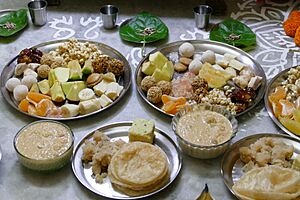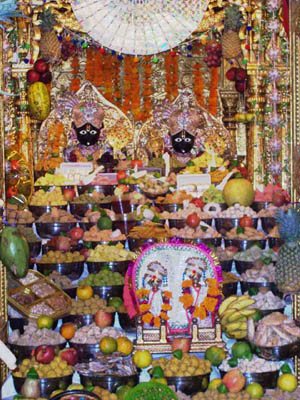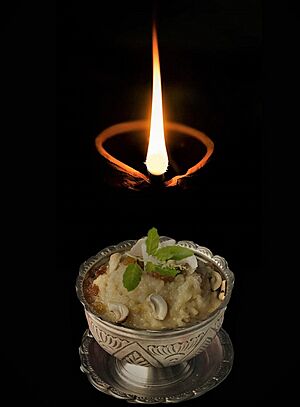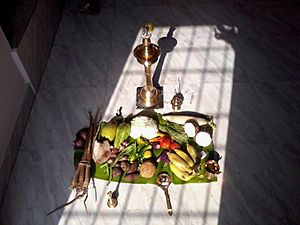Prasada facts for kids
Prasada (pronounced pra-SAH-da), also called Prasadam or Prasad, is a special religious offering in Hinduism. Most often, Prasada is vegetarian food that has been specially cooked. It is offered to a god or goddess as a way of showing thanks and praise. After being offered, this food is then shared with everyone who is there.
Sometimes, a very large offering of blessed food is called Mahaprasada. This food is offered to the deity (god or goddess) in a Hindu temple. After the offering, it is given out to all the people visiting the temple. Everyone can receive it, no matter who they are.
Prasada is closely connected to the word Naivedya. Naivedya is the name for the food when it is first offered to God. Once God has blessed it and it is returned to people, it is then called Prasada. So, Naivedya is the offering, and Prasada is the blessed food you receive back.
Contents
What Does 'Prasada' Mean?

The word Prasada comes from an old Sanskrit word. It means something like "grace," "favor," or "gift." It shows that the food is a special gift from a god or saint. This gift is then shared with their followers or other people as a good sign.
So, when you receive Prasada, it's like getting a blessing or a kind gift from the divine.
How Prasada is Used
Prasada is meant to be eaten by people as a holy offering. The offerings can include cooked meals, fresh fruits, or sweet treats. Most of the time, vegetarian food is offered. This food is then given to the people who are at the temple. Sometimes, certain foods like garlic or onion are not included in these vegetarian offerings.
Offerings in Temples
In some Hindu temples, especially those dedicated to certain goddesses like Chandi or Kali, or gods like Bhairava, different kinds of offerings are made. These can include meat from animals like roosters or goats. These offerings are part of specific traditions within those temples.
Offering food is a big part of upachara, which means "services" or "ways of showing respect" to a Hindu deity. The murti (the statue or image of the deity) is treated as if it were a living being. People offer food, fruits, and other items to show their devotion.
Temples often have strict daily routines for worship. This includes offering Naivedya many times a day. Usually, only specially trained priests are allowed to cook the Naivedya. Once the food is offered directly to the deity, it becomes Prasada. It is believed that the deity has "enjoyed" or accepted the offering. This is a symbolic act, meaning the deity has blessed the food.
Home Offerings
Offering food in home shrines is usually simpler than in big temples. A common practice is to mix the blessed Prasada back into the rest of the food. Then, everyone can eat it together.
It is very important not to taste the Naivedya food while it is being prepared. You also should not eat it before it has been offered to God. First, the food is placed before the deity. Then, special prayers are said with certain rituals. After this, the food is seen as blessed by God. It has officially become the holy Prasada.
Giving and Receiving
Prasada is created through a special process of giving and receiving between a person and the god. For example, a person might offer flowers, fruits, or sweets. The deity then "enjoys" or tastes a little bit of the offering. This substance, now blessed by the divine, is called Prasada. The person then receives it back to eat or use. It might be the same food that was offered, or it could be other blessed items shared by the temple. Many temples give out different kinds of Prasada, like nuts or sweets.
Offering food and then receiving Prasada is a central part of puja, which is a form of worship. Any food offered to the image of God, either physically or silently in prayer, becomes Prasada.
Prasada in Other Religions
In Sikhism, a special sweet called karah parshad is given to everyone after prayers. This Parshad is similar to langar (a free community meal) because it is given to everyone equally, without any difference.
Famous Prasada Examples
Some places are known for their special Prasada. For example, there is Kurukshetra Prasadam (a sweet called Channa laddu) in 48 kos parikrama of Kurukshetra. The Tirupati Laddu is famous from the Tirupati temple. And Mathura peda is a well-known sweet from the Braj Parikrama area. These are all examples of special blessed foods from specific regions.
 | George Robert Carruthers |
 | Patricia Bath |
 | Jan Ernst Matzeliger |
 | Alexander Miles |




